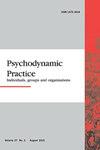一只名叫混沌的狗:内部心理动力学咨询对思考没有住所的心灵有什么用?
IF 0.4
Q4 PSYCHOLOGY, CLINICAL
引用次数: 0
摘要
本文章由计算机程序翻译,如有差异,请以英文原文为准。
A dog called Chaos: what’s the use of in-house psychodynamic consultation to think about the unhoused mind?
求助全文
通过发布文献求助,成功后即可免费获取论文全文。
去求助
来源期刊

Psychodynamic Practice
PSYCHOLOGY, PSYCHOANALYSIS-
CiteScore
0.90
自引率
0.00%
发文量
41
期刊介绍:
Psychodynamic Practice is a journal of counselling, psychotherapy and consultancy and it is written for professionals in all fields who use psychodynamic thinking in their work. The journal explores the relevance of psychodynamic ideas to different occupational settings. It emphasizes setting and application as well as theory and technique and focuses on four broad areas: •Clinical practice •The understanding of group and organisational processes •The use of psychodynamic ideas and methods in different occupational settings (for example, education and training, health care, social work, pastoral care, management and consultancy) •The understanding of social, political and cultural issues
 求助内容:
求助内容: 应助结果提醒方式:
应助结果提醒方式:


